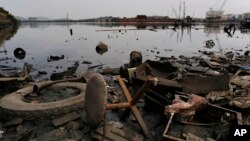Participants in water sports in the 2016 Rio Olympic Games will be exposed to dangerously high levels of viruses and bacteria, according to an investigation of water quality in the venues slated for next year's events.
The Associated Press reported Thursday that it has found extremely high levels of viruses and bacteria from human sewage in Olympic and Paralympic venues for swimming and boating events in the Brazilian resort city of Rio de Janeiro.
Some 1,400 of the Games 10,000 athletes are expected to compete in water sports in Guanabara Bay, off Copacabana Beach, and Rodrigo de Freitas Lake. Some of those events include rowing, canoeing and marathon swimming.
International Olympic Committee president Thomas Bach told reporters in Kuala Lumpur this week, after an IOC board meeting, that sanitation of Rio's water venues remains the biggest challenge facing next year's Games. He said some cleaning measures have begun already and others will be applied just before and during the Games.
AP said some competitors training in Rio have already fallen ill with fevers, vomiting, and diarrhea, despite assurances from Brazilian officials that the venues will be safe for competition.
The report says the Brazilian government tests waters for bacteria, which in many cases are short-lived, but not for viruses, which can live much longer. In testing commissioned by AP, experts found none of the water venues were safe for swimming or boating. Test results found high levels of active human adenoviruses, which cause both respiratory and digestive illnesses and can also lead to more serious heart and brain diseases.
U.S. expert Kristina Mena, who specializes in risk assessment for waterborne viruses, told AP that visiting athletes at all water venues will have a 99 percent chance of infection if they ingest just 15 grams of the water, though other factors such as immunity would determine whether they actually fell ill.
AP says the Brazilian practice of dumping untreated sewage into ditches and streams that empty into the ocean is at the root of the sanitation problems around the Olympic city. Thursday's report says the stench of raw sewage greets travelers at the Rio airport, prime beaches are thick with sludge, and fish die-offs have left the Olympic lake littered with rotting fish.
It says despite Brazil's vows in its Olympic bid to clean up its water venues, a population explosion plus chronic mismanagement have stymied such efforts. While Brazil promised to build eight water treatment facilities to handle the trash flowing into Guanabara Bay, only one treatment facility has been completed. Water dredging projects to clean up the green lagoons surrounding Olympic Park have yet to even start.
Rio Governor Luiz Fernando Pezao has said there will not be time to finish the cleanup of the bay before next year's games, and Rio Mayor Eduardo Paes has said the thwarted cleanup efforts represent "a wasted opportunity."
The Rio Olympic committee did not comment on the story, although their website still promises rehabilitation of the area's bays and canals.





